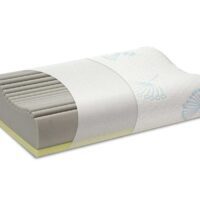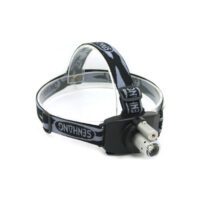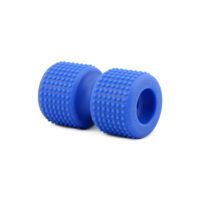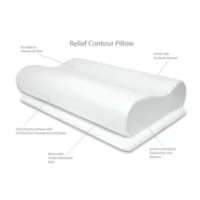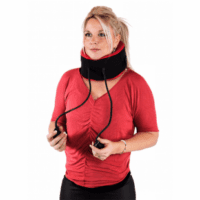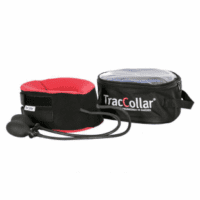Neck Sprain
Article by John Miller

Neck Sprain
What is a Neck Sprain?
A neck sprain, neck spasms, neck muscle strain, or simply neck muscle pain, are common conditions.
Neck sprains are perhaps the most frequent cause of neck pain, and the good news is that they heal and rehabilitate quickly.
What Causes Neck Sprain?
Most neck sprains are related to muscles, ligaments, or joints. Muscle fatigue (resulting from poor posture, extended sitting or sleeping, such as wry neck), heavy lifting, and high-speed injuries (like whiplash or concussions) are the primary culprits. Common causes of neck injuries involve strained neck muscles, sprained ligaments, or dysfunctional neck joints, especially when pain emerges abruptly during or after physical activity.
The causes of neck pain can be categorised as follows:
Neck Muscle Strain
Neck muscle pain is the leading source of neck discomfort, often linked to muscle fatigue, excessive loads, or improper posture during lifting or sitting.
Posture Fatigue
Poor posture while sitting, standing, or lifting at work can strain your neck and spine. Muscle fatigue or overextension can stretch ligaments and discs, putting pressure on spinal joint muscles and nerves, leading to neck or back pain.
Neck Ligament Sprains
Ligaments are robust, fibrous bands that limit movement at each spinal level. Stretching them too far or too fast can result in tearing, leading to swelling, spasms, and pain. Common causes include awkward lifting, sports injuries, and motor vehicle accidents like whiplash.
Symptoms of Neck Sprain
Neck muscle pain symptoms range from a mild ache, stiffness, spasms, muscle knots, to sudden, severe neck pain and even shoulder or shoulder blade pain.
Typical neck sprain symptoms include:
- Localised neck pain and stiffness.
- Neck muscle tenderness, tightness, knots, or spasms.
You may feel better when at rest or with neck support, but changing your neck’s position, such as looking down, up, or sideways, can be painful.
Warning Signs of a More Serious Neck Injury
In severe cases or if you experience constant, intense neck pain, pins and needles or numbness, it may indicate a more substantial injury, like a disc bulge or pinched nerve. These can affect your upper and lower limb function, and in severe instances, even your bladder or bowel control. In such cases, consult your nearest hospital, doctor, or physiotherapist.
Neurological signs:
- pins and needles (paraesthesia) in your neck or arm
- numbness (anaesthesia) in your neck or arm,
- arm or leg muscle weakness,
- altered tendon reflexes (e.g. biceps to triceps jerk),
- difficulty lifting arms overhead or walking,
- loss of control of the bladder or bowels.
Neck Sprain Diagnosis
Distinguishing between a neck muscle strain and ligament sprain can be challenging due to their similar symptoms. Seek the professional guidance of a healthcare practitioner, like your neck physiotherapist, to accurately assess your condition. Diagnostic tests like X-rays, MRI scans, or CT scans may be recommended to determine the extent of your injury.
Neck Sprain Treatment
Get a Professional Diagnosis!
Consult a spinal health professional, such as a physiotherapist, for a thorough evaluation of your neck. While pain relief is a primary goal, addressing your injury comprehensively is essential to prevent future recurrence.
Neck Sprain Treatment Goals
PHASE I – Pain Relief & Protection
Your initial focus in neck sprain treatment is pain management and protection. Various tools may be employed to alleviate pain and inflammation, including ice, electrotherapy, taping techniques, soft tissue massage, and back braces. Medication, such as ibuprofen, may also be recommended.
PHASE II – Restoring Normal ROM, Strength
Once pain and inflammation subside, your physiotherapist will concentrate on restoring normal neck motion, muscle strength, endurance, and joint position sense. They will design a muscle stability program tailored to your specific needs.
PHASE III – Restoring Full Function
Recovery aims to restore your function for a safe return to daily activities or sports. Your treatment will be personalised based on your unique demands.
PHASE IV – Preventing Neck Pain Recurrence
Preventing a recurring neck pain is crucial, often linked to insufficient rehabilitation. Regular exercises targeting deep neck flexor muscles can enhance neck stability and minimise the risk of re-injury.
Neck Pain Treatment Options
Your physiotherapist can discuss various treatment options, depending on the source of your symptoms, such as joint techniques, stretches, strengthening, posture improvement, acupuncture or dry needling, massage etc. Please be guided by their professional care.
Recovery Expectations
Early diagnosis and treatment are vital for a quicker recovery. While pure neck muscle pain can improve within a week or two with proper management, prolonged pain may signal an underlying issue.
Most individuals recover from neck pain within 4 to 6 weeks, but this can vary based on the nature of the injury and your treatment plan.
Preventing Recurring Neck Pain
If you’ve experienced neck pain before, you’re at a higher risk of recurrence. Following your physiotherapist’s guidance and maintaining proper posture and lifting techniques can help reduce this risk. Discuss your daily activities with your physiotherapist to learn how to minimise the risk of injury based on your specific condition and weaknesses.












